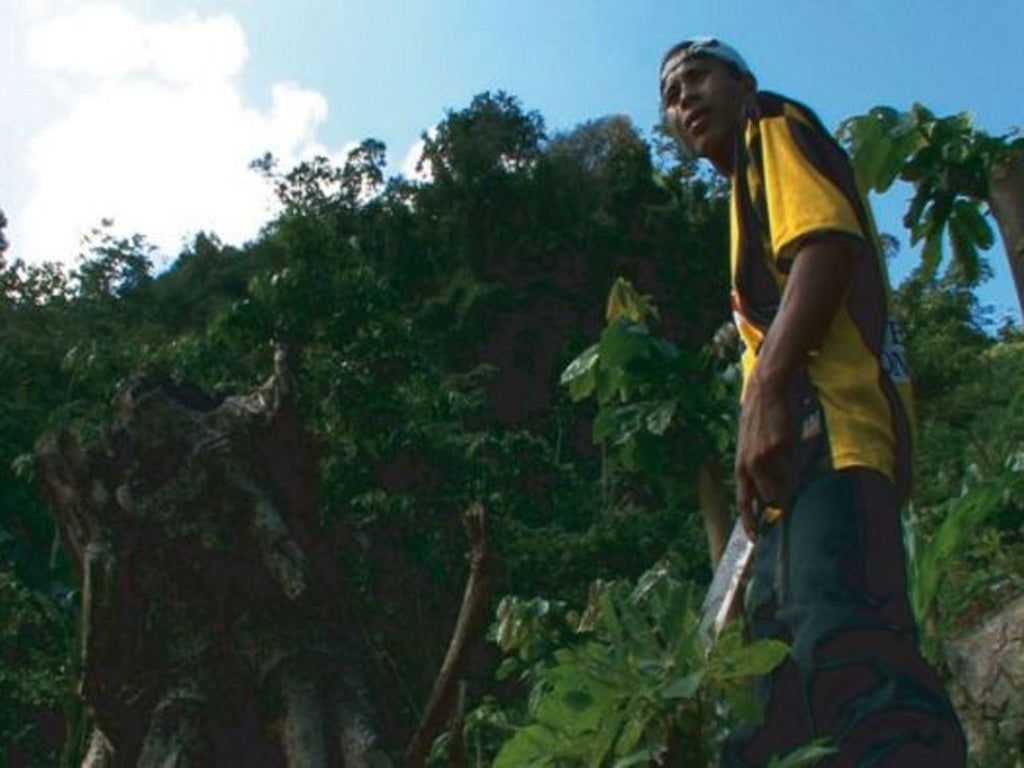Last Night's TV - True Stories: Up in Smoke, More4 / Hedge Wars, BBC1 / Cinema Verite, Sky Atlantic
Green man fails to set the world on fire

True Stories: Up in Smoke began with an old man called Santos talking about the bad old days. It was all trees here then, he said, whole place full of animals, and the canopy so dense that it was dark in daytime. "There were no roads, but we cleared it all." He seemed pretty proud of what he and his contemporaries had achieved. But for the ecologist Mike Hands (and, let's face it, pretty much everyone in the audience for a More4 documentary) he was sitting in the middle of a "slowly enacted catastrophe". Santos was a slash-and-burn farmer and thus – in Mike's eyes – responsible for an ongoing ecological disaster. Mike doesn't hold this against him personally (he knows he's got to eat), but he hopes that he might be able to persuade him to do things differently in future.
Adam Wakeling's film was about a good idea dying for lack of sunlight. "You have got to learn from what the forest is doing," said Hands, who's spent well over 20 years studying the problem of slash-and-burn farming and trying to come up with a better way for subsistence farmers to make ends meet. His solution is what you might call Rainforest 2.1, a system called alley cropping, in which food crops are planted between rows of inga trees, which themselves provide firewood, fertiliser and, at the right point, enough shade to choke out competing weeds. Hands knows it works, but his problem is convincing people like Aladino – a Honduran subsistence farmer – that it's better than torching a section of rainforest and then moving on to a new patch when that one is exhausted.
"If you knew what's really going on with malaria and you didn't do anything about it... you would be bloody culpable," Hands said, explaining the dogged persistence he's brought to his cause. And it was about here that you wondered whether Up in Smoke had told you everything you needed to know about alley cropping. "It'll grow like a virus," Hands said of his technique. But if that was true why hadn't it done so already and why did he need to monitor his guinea pigs so carefully? Viruses don't usually wait on government funding before they start to spread, and that should be true of viral ideas too. A line in the script about how Aladino had needed a good crop "to fund the changeover" hinted at one possible answer to the puzzle. If you're a subsistence farmer any method that takes a year or two to bed in before it delivers results may be as unreachable as the moon.
Not all deforestation is bad, as you'd know if you lived next door to an out-of-control leylandii. Hedge Wars, Nick O'Dwyer's film about "the plant which ate suburbia", visited several people who longed to hear the friendly sound of a blatting chainsaw, letting sunshine and sky back into their lives. Apparently, the leylandii is the result of a botanical affair on a British estate between two American conifers that would never normally have met. Nobody yet knows how tall their illegitimate children will actually grow, only that they do it at a prodigious rate if left alone. Victims here included the residents of a block of flats, living in sepulchral darkness because of an overgrown vicarage hedge (the diocese declined to comment but did not appear to be behaving in a very Christian manner) and the residents of a Barry cul-de-sac who couldn't agree on who should pay for a trim. There was also one satisfied customer, a jolly Keighley nudist who keeps his leylandii on a tight rein to provide a modesty screen. His neighbours have no complaints.
Cinema Verite, HBO's drama about the making of pioneering reality documentary An American Family was a good idea poorly executed. James Gandolfini played Craig Gilbert, who came up with the idea of putting a camera crew in the Santa Barbara home of the Loud family in 1971, after making a documentary about the anthropologist Margaret Mead. The studio bosses were sceptical but Gilbert knew there was drama behind the suburban ordinariness and, according to this reading, wasn't over-scrupulous about how to bring it into the open. They'd found good matches for the original participants, and there was a certain fascination in watching the segues between documentary artifice and artificial documentary. But the script was so clunky it virtually came with visible bullet points. The Louds reportedly received a cash settlement to keep their disgruntlement about the drama to themselves – and Gilbert disputed its account of events – which seemed more telling about television's corrosive power than anything in the drama itself.
Join our commenting forum
Join thought-provoking conversations, follow other Independent readers and see their replies
Comments